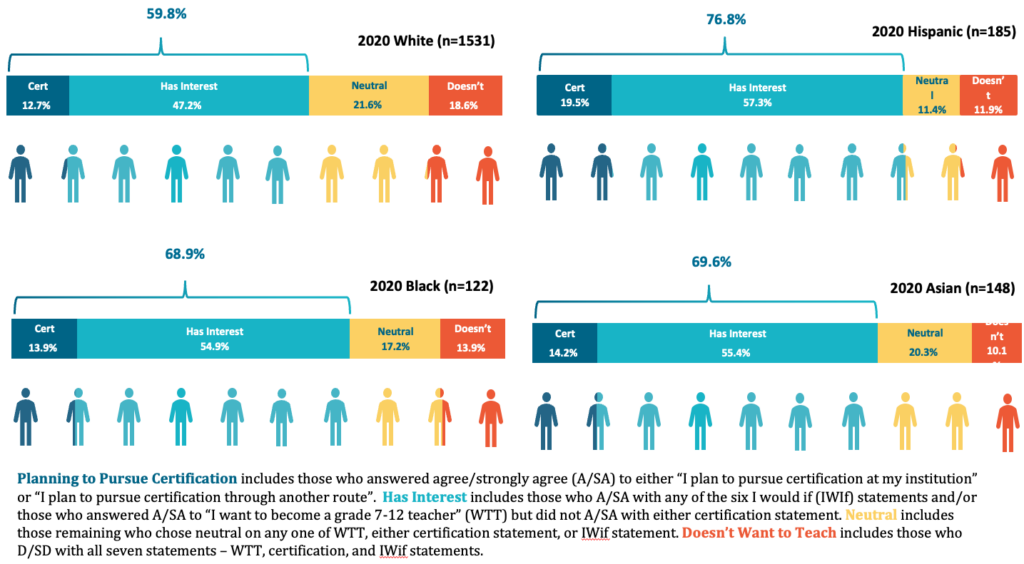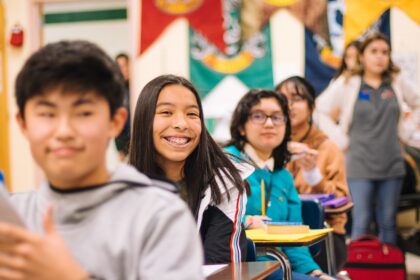What do faculty need for their STEM teacher recruitment efforts?
Get the Facts Out (GFO) held a virtual mini-conference on Sept 30, 2021, bringing together leaders in chemistry, mathematics, and physics teacher preparation to strategize about recruiting teachers in these disciplines. The group of 70 registered GFO Champions, Change Agents, and GFO Project Team members shared information and ideas about STEM teacher recruitment in several large and small meeting sessions. A post-conference evaluation survey found that participants thought the event was very valuable for their teacher-recruitment efforts.
During this interactive and engaging half-day experience, the participants:
- heard about the latest and greatest resources and research results on STEM teacher recruitment from GFO;
- networked in small, cross-disciplinary groups;
- convened with fellow disciplinary experts (physics, chemistry, or mathematics) to tackle the question “How can GFO create resources and other supports to help you with your recruitment efforts?;”
- reflected in the same small, cross-disciplinary groups; and
- reconvened as a whole to share ideas.
Opening Session: The latest and greatest resources and research results on STEM teacher recruitment from GFO
GFO Principal Investigator Wendy Adams kicked things off with a presentation on what’s new with the GFO resources and the website.
Download the slides (.pptx) Watch the video (YouTube)
Key Takeaway:
The #1 reason students choose NOT TO teach is: They perceive teachers’ salaries as lower than they are.
The #1 reason students choose TO teach is: They want to make a difference.
Of particular interest was the new analysis of GFO data collected from 2,000 STEM majors on their interest in becoming a teacher. That analysis showed that students identifying with a minority subgroup (Hispanic, Black, or Asian) had a higher interest in becoming a teacher than their white counterparts (77%, 69%, and 70%, respectively, vs. 60% for white STEM majors).

This new finding suggests a way to attract more minority students to STEM fields, by advertising teaching as a career option available to STEM majors. Since many students have not yet decided on a career path when they enter college, they likely want to keep their options open. If students interested in teaching (including many minority students) know that teaching is a career option for STEM majors, perhaps more of them will choose STEM majors. Going forward, GFO will investigate using minority students’ interest in teaching as a way to increase the number of minority students majoring in STEM degrees.
Disciplinary Conversations: How can GFO create resources and other supports to help you with your recruitment efforts?
The rest of the five-hour mini-conference was devoted to small-group and whole-group discussions around questions posed by participants, particularly questions about ways that the GFO Team and the disciplinary partner societies can support the work of the GFO Champions going forward.
The disciplinary groups in chemistry, mathematics, and physics each developed a list of ideas for opportunities and challenges to teacher recruitment in their discipline. These groups then developed priorities for action items that can be taken up in the near future to support teacher recruitment. Examples of these included:
- Connect and communicate effectively with discipline-specific faculty and encourage them to talk to students about a teaching career
- Develop a way to express or capture the “geek-out” moment of joy, wonder, and beauty that teachers feel, and convey that experience to prospective teachers
- Find ways to connect with career-changers (a large pool of potential teachers), working with Alumni offices or career centers to share GFO messaging with these people and utilizing Noyce grants and other funds to support their teacher education
- Collaborate with GFO Champions from different departments at your institution so that the message is consistent
- Offer to give GFO presentations at departmental colloquia at your own institutions or other institutions
Networking Groups: How do teacher recruitment needs differ among the disciplines – math, physics, and chemistry?

Before and after the disciplinary conversations, participants were placed into small, cross-disciplinary, break-out groups of 6-10 people each. Participants were strategically grouped by the organizers so that Champions from each STEM discipline were represented along with an education faculty member, a GFO Change Agent, and a GFO Project team member. Many participants remarked that they enjoyed these groups as an opportunity to meet other Champions from different disciplines and find out about specific strategies others are using to improve their teacher recruitment.
Closing Discussion: How can GFO promote positive stories about teaching?
The last part of the mini-conference was an open discussion for all participants. As a group, they chose to focus on GFO’s intention of giving airtime to the positives of teaching. (This intention is informed by GFO’s research on messaging, which found that mentioning negatives to students and faculty tends to bring out their negative thinking and provides additional credibility to the negatives.)
Participants talked about how the negatives already get plenty of airtime in the media and how we need more great teachers in the classroom. No matter what is happening in education, they agreed, the most important thing we can do to improve the situation is to get more great people into the classroom and into education.
To that end, it’s important that STEM majors who are interested in pursuing teaching as a career (and there are a lot of them) are not discouraged from that interest due to incorrect information or misperceptions about teaching.
No matter what is happening in education, the most important thing we can do to improve the situation is to get more great people in the classroom and into education.
The group came up with several suggestions for what GFO could develop that would promote the positive stories about teaching:
- A list of FAQs about teaching and becoming a teacher, with answers from actual teachers, both video format and written
- Informal video interviews of teachers talking about why they became a teacher, what they love about teaching, or why they changed careers to become a teacher
- A reframing of the real, common challenges of teaching to incorporate the positives of what teachers can do or get to do
Post-conference Evaluation Survey: The conference focused on the right goals!
Many participants indicated that attending this virtual get-together was useful and that they would like to see more of these events in the future.
![]() The post-conference evaluation survey showed that participants:
The post-conference evaluation survey showed that participants:
- enjoyed getting to touch base with others in the GFO community and meeting other Champions and teacher education faculty from other disciplines,
- agreed strongly that the conference focused on the right goals for their discipline, and
- indicated that the conference hit the mark for them or that the conference was “excellent.”
When asked about challenges and opportunities for building a network of teacher educators, several indicated they would like to share ideas and resources along with stories of success and examples of how they were accomplished. Many respondents plan to undertake recruitment activities using GFO materials to directly recruit students or to share GFO materials with those who do recruit. Many participants expressed that they were very interested in participating in a future similar conference.
One significant area for future work for the GFO project that surfaced throughout the conference, and was a major area of focus in the final discussions of the day, was the development of resources, strategies, and training for Champions on how to respond to negative perceptions and messaging about teaching. This requires being careful to address negative narratives without giving them undue airtime and without appearing to just sweep them under the rug.
Thank you!
All in all, the conference was a success! We at GFO gained valuable insights from the participants in each discipline while the participants felt it was also a good use of their time and that they gained valuable insights from the conversation. The GFO Resource development team as well as the disciplinary societies now have many new ideas and plans for this next year based on the conversations at the mini-conference. Thank you all for your time and participation! We look forward to the next year of working with you on our STEM teacher recruitment efforts.



